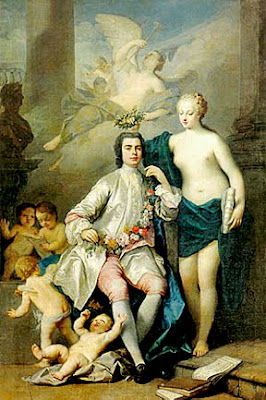

Of all the weirdnesses I’ve produced on this blog, this may be the weirdest. I don’t know what got me onto this, and it was not even a new topic, but it was the first time I’d explored it to this depth.
There was a time, and thank God it’s over, and a place, now more enlightened, when little boys who sang well were altered so that their voices would never change. Sounds innocent enough, until you realize that this was the kind of alteration farmers did to bulls to fatten them up and render them docile.
Yes. These little boys, usually on the verge of puberty, were subjected to the most barbaric procedure imagineable, all in the name of “art” (or, more likely, commerce). There was money to be made in transforming your innocent little choirboy son into . . . a castrato.
An awful word, isn’t it – though it does sound a bit like Capistrano, where the swallows come back to. Awful because this took place in the 18th and 19th centuries, mostly in Italy and other parts of Europe, when surgery involved a belt of whiskey and (if you were lucky) a sharpened knife. (Actually, the instrument, still in existence as a Medieval-looking artifact, resembles the jaws of a shark or a bizarre pair of scissors. Even I have limits here, and won't include a photo.)
The child probably wouldn’t get the whiskey because it wasn’t good for him. After the surgery, once he could walk again, he would be subjected (again, without his consent: “please, Daddy, may I have my testicles removed so I can be a great singer?”) to many hours a day of rigorous vocal practice.
From what I can gather from my usual ghoulish research, the boy would retain his small childlike vocal cords, but grow in stature and lung capacity so that giant gusts of air would be forced through tiny little reeds. Same principle as an oboe, really: and oboeists tend to go crazy and have strokes later in life from all that forced air.
This wasn't the only physical peculiarity of the castrato, who was quite literally emasculated, a eunuch with a permanently arrested sexual identity. The burst of testosterone responsible for beard growth, broadening of shoulders, deepening voice, and all the other yummy things that happen to men at puberty (excuse me, I forgot myself) just didn't happen. Joints didn't fuse and harden, with grotesque consequences: arms and legs grew unnaturally long, as did the ribs, resulting in a barrel chest. Good for singing, bad for looks.
The castrato's body was kind of like a fat woman's, with broad hips and enlarged breasts. Combined with long spindly limbs and a soft, rounded, beardless face, they must have looked Halloweenish, but the funny thing is, women loved them. Loved the androgynous look, and swooned when their operatic she-males sent their voices soaring into the stratosphere.
I try to imagine it in my mind, but it's not easy. A gorgeous soprano sound, stoked and pumped up by huge lungs, the volume sufficient to shatter glass. And then there was that legendary ability castrati like Farinelli had to sustain a note for a full minute. Like slowly letting the air out of a very large balloon.
We'll never really know what this freak voice sounded like, but we have an approximation. Just listen to Alessandro Moreschi, if you can stand it. He looks soft-featured, round-faced, almost childish, though in his photo he is well into middle age. All the portraits of famous castrati that I found look the same, as if they’re all genetically related. Some of them look more like multiples, hatched out of the same egg.
Actually, they are related, not just by vocal brilliance but by mutilation. Moreschi is called the “last” castrato because he was the only one whose voice was ever recorded. His singing gives you a tantalyzing taste of what audiences seemed to crave a few hundred years ago. The impression I get here is a voice desperately trying to be tenor. The “attack”, the interpretation, the way he puts the song out there, all have a masculine sensibility, like a tenor’s (and believe me, being a tenor isn’t just about singing).
Then, suddenly and without warning, it swoops into the stratosphere, throbbing for just one instant with beauty and glittering with overtones that somehow come through even on the most primitive recording equipment.
We do have countertenors today who can sing a kind of mezzo-soprano. But their voices tend to have a “hooty” quality, a falsetto which is, let’s face it, false: a man’s voice forced up through the nose into the various vibrating cavities of the sinuses. It's a little like Curly of the Three Stooges (and I have nothing against Curly - I think he was a genius - but that wasn't his real voice. He had a normal male register which he seldom used on the screen.)
Moreschi sings in a “true” voice, which, while technically weak, mannered and likely ridden to death by too much performing (like a race horse being forced to run on shattered tendons) is capable of an awful kind of beauty. Awful, because a man who isn’t a man can’t live in any way except through his music. Conventional intimacy would be impossible, and he’d appear and sound freakish.
Castrati were celebrated and petted like lap dogs, even rumored to be great lovers (which was not very likely), but were never considered normal men. This is a tortured sound, reminiscent of bound feet in gorgeously-embroidered Chinese slippers. Mutilated into beauty. I know I should, but I just can’t turn away.
